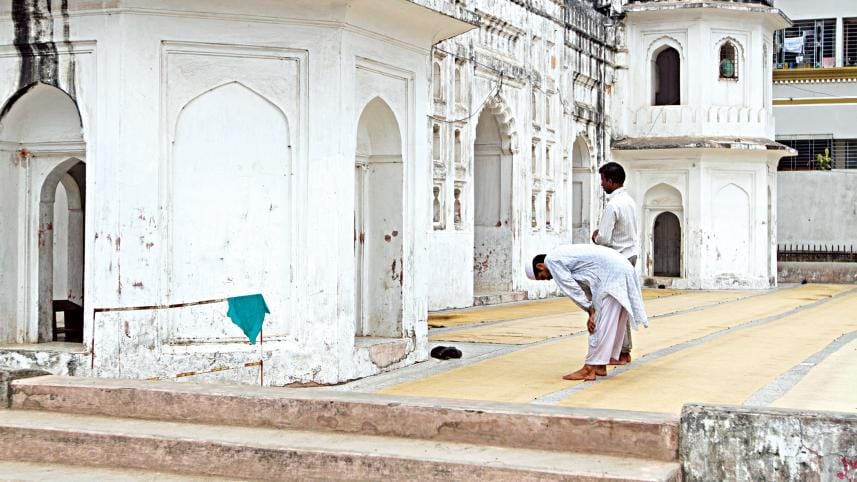The spirit of Fajr

"Prayer is better than sleep" — I listened to these melodious words of the muezzin booming out of the loudspeaker of a mosque, as I wearily made my way out of Nazira Bazaar. The culinary hub, even at that odd hour of the clock, swarmed with crowds last year; it is, after all, renowned for its sehri hangouts.
Despite the weariness of staying awake the whole night and spending time with friends whilst rejoicing the many treats Nazira Bazaar had to offer, my ears did not fail to pick up these special lines of adhan (call to prayer) which are only recited for Fajr prayer.
Fajr is a unique time of the day, I reckon. It is a time when the world is mostly at rest; a time for contemplation as the hustle and bustle of the day is yet to start. Also, not many things capture the beauty of nature as a sunrise does.
Moreover, our beloved Prophet had attached a lot of value to this prayer. To illustrate, mentioned in Sahih al-Bukhari, is this narration by Jarir bin 'Abdullah:
We were with the Prophet on a full moon night. He looked at the moon and said, "You will certainly see your Lord as you see this moon, and there will be no trouble in seeing Him. So, if you can avoid missing (through sleep, business, etc.) a prayer before the rising of the sun (Fajr) and before its setting ('Asr) you must do so..."
Despite that, some of us do not put the effort of waking up for Fajr, let alone going to the mosque to pray in congregation. And the Fajr congregation at mosques on a regular day, generally speaking, sees a relatively small attendance.
On the other hand, if you ask those who daily attends Fajr congregation at a mosque, it is likely that many of them may talk of a sense of fraternity and bonding between their fellow Muslims attending the congregation. It is perhaps because of a kind of friendship that forms when you see the same small group of people everyday who gather together with the same purpose in their hearts.
But of course, it goes without saying that it is unwise to attend gatherings of any kind in this time of the ongoing pandemic. For now, we can cherish the peace and calmness of praying from our home.
But waking up so early may be an arduous challenge sometimes! Another hadith enshrined in Sahih al-Bukhari comes to mind. As narrated by 'Abdullah bin Abi Qatada:
My father said, "One night we were travelling with the Prophet and some people said, 'We wish that Allah's Apostle would take a rest along with us during the last hours of the night.' He said, 'I am afraid that you will sleep and miss the (Fajr) prayer.' Bilal said, 'I will make you get up.'... The Prophet got up when the edge of the sun had risen and said, 'O Bilal! What about your statement?' He replied, 'I have never slept such a sleep.' The Prophet said, '.... O Bilal! Get up and pronounce the Adhan for the prayer.' The Prophet performed ablution and when the sun came up and became bright, he stood up and prayed."
Fajr for me means discipline: going to bed on time and getting up on time. When successful, the hours between these two somehow become very productive. There is something about starting your day early. With the feeling that you are 'ahead of time' and that you have been granted a head start, you feel motivated.

And yet, sleep or weariness often gets the better of me, like it did that time last year when I was in Nazira Bazaar. As I returned home and jumped onto the bed, the last thing I heard was my disciplined and pious father's 'monajat' — plead to protect his family, to forgive his sins, and also to safeguard his business from all troubles.
His monajat in the early morning is always preceded by dikr, recitation of the Quran, and Fajr prayer itself — a routine I never saw broken. For my father, an entrepreneur who doesn't shy way from taking risks and dealing with the million uncertainties that comes with it, his activities surrounding Fajr are, I believe, therapeutic.
Indeed, a peace of mind comes with surrendering oneself to a supreme authority, the constant among all uncertainties.
His and all the Muslims' Fajr and other prayers are witnessed and recorded by angels; and may those of us lagging behind can also make prayers a habit; after all, Sahih al-Bukhari tells us, as narrated by Abu Huraira:
Allah's Apostle said, "There are angels coming to you in succession at night, and others during the day, and they all gather at the time of 'Asr and Fajr prayers. Then the angels who have stayed with you overnight ascend (to the heaven) and He (Allah) asks them though He perfectly knows their affairs. 'In what state have you left my slaves?' They say, 'When we left them, they were praying and when we came to them, they were praying.' "
Here's to a spiritual and happy Ramadan!
Photo: Ls Archive/ Sazzad Ibne Sayed



 For all latest news, follow The Daily Star's Google News channel.
For all latest news, follow The Daily Star's Google News channel.
Comments